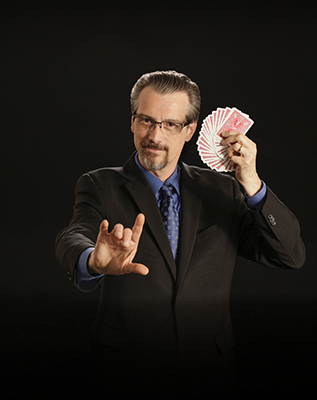
From Lawrence Hass, Ph.D., the Associate Dean:

A Fundamental Mistake
In a recent Museletter I peeled back the veil to share “A Fundamental Secret†about performing. In brief, my secret was a mantra I had learned from over twenty years of performing in the real world: “The fundamental business of every magic show is relationship-building.â€Â (1)
I am deeply gratified by the positive response this essay received from readers all over. And it has emboldened me to extend my reflections this month by sharing what I have come to see as a fundamental error in magic. I believe this mistake, this error, is so widespread and with such negative consequences, that if magicians everywhere would resolve themselves to avoid it, the general reputation of magic would rise a hundred-fold. Here is the principle that’s so easy to forget:
Perform from the center of your skill set, not the edges.
Indeed, as I watch magic–by professionals and amateurs alike–I see this problem over and over: performers attempting something that is simply too hard for them. Their hands shake, techniques flash, eyes turned inward, tension in the hands and body, too much thinking, the words feel rote. And the experience of magic leaks out of the tank.
How does this happen? Why does it happen so much? I believe a big part of it is a myth that runs pretty deep in our magic subculture—the notion that a trick gets better and more praiseworthy the harder it is. And along comes the notion that magicians are measured by their technical skill level. (“My sleight is bigger than yours!â€) Never mind that their “Pass” flashes, that their fingers flutter when they do the “Cull”, that anyone with eyes can tell two cards are being turned over as one, that everyone knows something happened right there.
May I say the emperor has no clothes? May I offer the following suggestion to unsettle this “myth of technique� I would say that the measure of a trick is how invisible the secret is, and the measure of magicians is whether they astonish and delight their audiences with the things they perform.
Of course sleight-of-hand is part of the game. While it is true there is excellent magic that is sleight-free (for example, BEKOS, B’Wave and many things created by the amazing Wayne Dobson), sleight-of-hand is such an important part of our tool kit that it behooves those of us who are “temporarily abled†to spend a good deal of time in that playground. But again, in my view, here is how that time should go: “Practice at the edges of your skill set, but only perform from its center.†Never fear: with time, loving attention, and regular practice those difficult skills at the edges will find their way into the center, and your range will expand. But there is no reason to sit by the sidelines while you wait. As Eugene Burger constantly reminds our students: “There is excellent magic at every skill level.â€
Do you feel what a difference committing to the center would make to your confidence? Do you see how leaving the too-hard stuff at home (for now) will empower your performance and your ability to build audience relationship? What pieces are you attempting in public that aren’t really, honestly in the dead center of your skill set?
I promise you: everything about magic performance gets better and more fun—for our audiences, too—when we perform from the core of our confidence, rather than at the shaky, uncertain, self-absorbed edge of disaster.
Note
(1) “A Fundamental Secret†first appeared in the February 2015 Museletter. A revised version was published in my Inspirations: Performing Magic with Excellence (Theory and Art of Magic Press, 2015), pages 161-163.